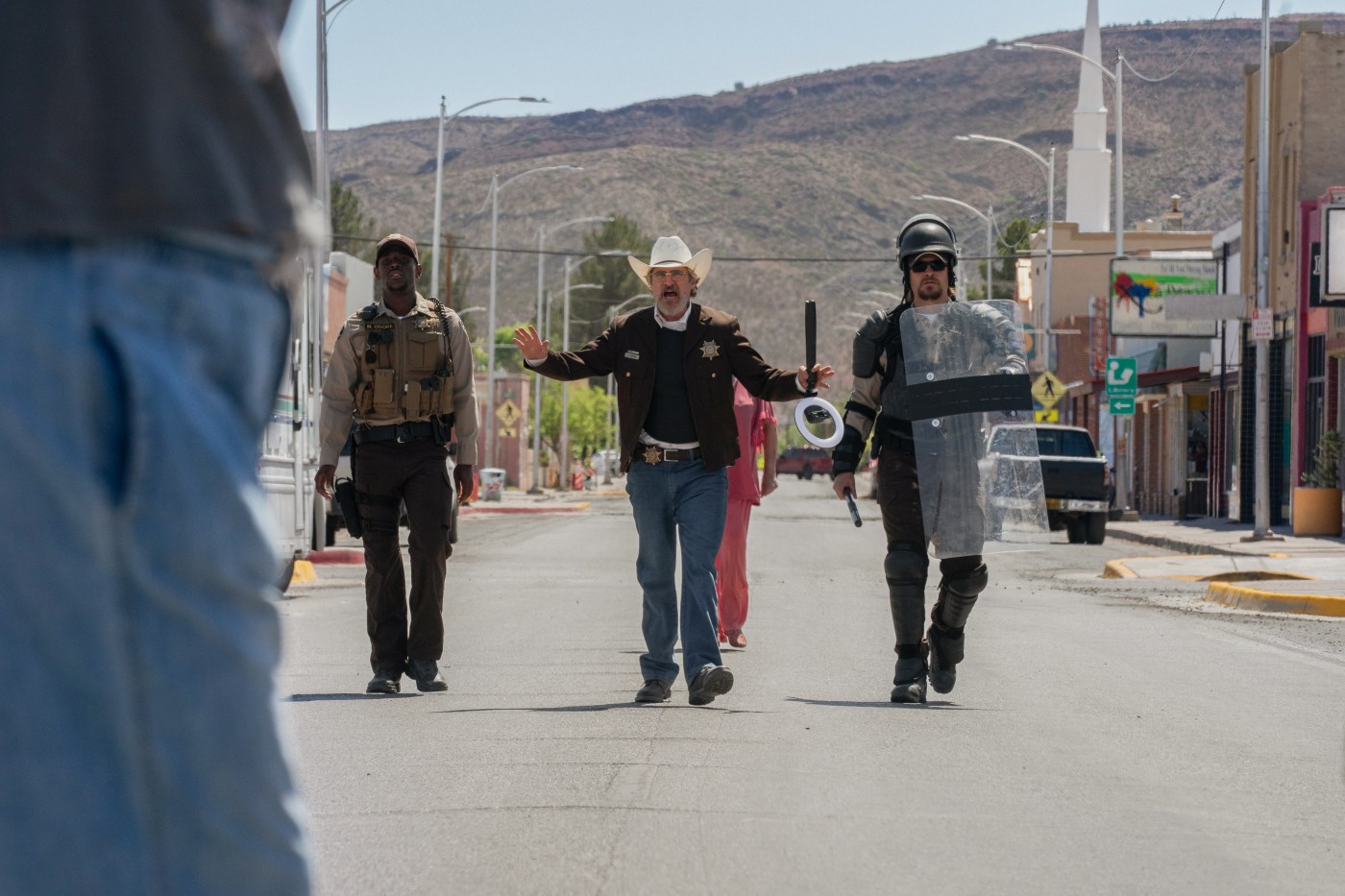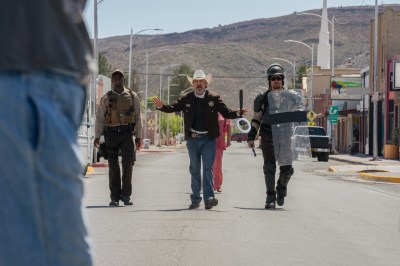Editor’s Note: The following contains spoilers for Eddington.
Back in 2012, Daniel Katz, David Fenkel, and John Hodges founded A24 Films for the express purpose of making better movies.
From their point of view, the movie-making industry had lost its way, abandoning more creative films in favor of boring blockbusters. And right off the bat, the new company seemed to succeed in boosting that creativity: A24, even in its early days, made movies that looked different and felt different—prioritizing elegant cinematography and unique storytelling. From Spring Breakers (2013), a candy-colored, hard-partying flick in which four college students fall in with the wrong crowd, to Enemy (2013), an emotional thriller featuring Jake Gyllenhaal in a dual role, A24 offered a welcome counterpoint to the big-box films Hollywood released that year. And since then, A24’s commercial success has grown: A24’s Moonlight famously won the Best Picture Oscar in 2016 and, two years later, Greta Gerwig’s Lady Bird won the Golden Globe for Best Motion Picture - Musical or Comedy. In 2022, Everything Everywhere All at Once (2022) grossed more than $140 million worldwide and captured seven Oscars.
That latter title became known for its all-encompassing weirdness, involving talking rocks and fingers made of hot dogs. But more recently, A24 has dialed back the oddities, seen prominently in its latest offering, Ari Aster’s Eddington.
Set during the early days of the COVID pandemic, Eddington takes place in a fictional New Mexico town of the same name (population 2,435) and pits a traditionalist, gun-toting sheriff against a tech-bro mayor. Darius Khondji’s cinematography imbues the movie with a macabre beauty, giving it a classic Western feel as his camera lingers liberally on the landscape. The pandemic has emptied Eddington’s streets, New Mexico’s governor has rolled out strict containment procedures—to the chagrin of some residents—and, taking this all in, the viewer finds themselves right back in the worst moments of 2020.
Aster distills the absurdity of that year into a single narrative, satirizing social justice, right-wing fearmongering, senseless violence, and—above all—political polarization. Sheriff Joe Cross (Joaquin Phoenix) takes a firm stance against big government, mask mandates, pedophilic elites, and “parasitic” tech companies—all the familiar right-wing bogeymen from that fateful year, ranging from rational to the absurd. He wants to keep Eddington just the way it’s always been, like his dad did when he was sheriff.
Cross’ foil is Mayor Ted Garcia (Pedro Pascal), a stereotypical anti-racist who wants to bring a huge data center to Eddington. Garcia spends most of the movie with an N95 mask seemingly stitched to his face, standing in for all the bandwagon social justice warriors. His son (Matt Gomez Hidaka) becomes an Instagram activist, spurred on by his virtue-signaling peers. Other youngsters, like Brian (Cameron Mann), learn to question their “privilege” and reckon with “systems of oppression.”
These themes form the core of Aster’s broader project, especially as the BLM protests begin to rock the country and hijack the movie. Protesters and rioters flood Eddington’s streets, a stark contrast to the eerie emptiness that characterized the beginning of the film. Cross, now running for mayor against Garcia, struggles to contain the literal and metaphorical flames of social justice burning down his town.
In Aster’s hands, social media is an isolating, destructive force that warps our brains beyond recognition and threatens our personal relationships. Cross’ wife, Louise (Emma Stone), splits her time between peddling misinformation on Facebook and making vaguely satanic dolls while her mother, Dawn (Deirdre O'Connell), fine-tunes some conspiracy theories of her own. At one point, Dawn observes that the government ran a “coronavirus” pandemic simulation in 2019—that obviously can’t just be a coincidence and has to be some kind of evil trial run for COVID. (Our wonderful team at The Dispatch Fact Check assures me no evidence supports Dawn’s theory.)
Over the course of the film, Aster is careful to caricature both the left- and right-coded characters. Cross, as his mayoral campaign treads water, simply calls his opponent a “rapist” and a “pedophile,” and slowly tumbles down the dark and lonely hill of right-wing conspiracy. On the other hand, Mayor Garcia’s son and his friends plaster their Instagram accounts with black squares, photos of their activities at various protests, and exhortations for their peers to get out and fight against systemic oppression.
Eddington starts out slow, but gradually picks up speed and finally culminates in a manic gun-battle between Cross and masked snipers (I think they’re supposed to be Antifa?). The third act devolves into unadulterated mayhem: People just start attacking each other in the streets, turning the whole city into a war zone. When the smoke clears, the poor sheriff’s world has been destroyed forever: His paranoia-induced rampage leaves him permanently crippled, drives his wife away, and turns Eddington into a smoking ruin. Mayor Garcia does not escape the chaos either, suffering a brutally violent, politically motivated assault. And, at the end of the movie, it’s all for naught: The Man (SolidGoldMagikarp AI tech company) still wins and gets its data center.
Eddington is a dark, depraved movie—but, tragically, that’s about it. Once you clear away Phoenix and Pascal’s solid performances and look past the camerawork, the story is as thin as a tortilla. Aster’s relentless cynicism undermines his mission on two fronts.
First, he offers neither explanation nor prescription for our social maladies. In failing to do so, the audience has little reason to identify with or to root either for or against his characters. We know they are doomed. But, maybe, that’s the point—we’re all beyond saving.
Second, and more importantly, his subject matter is so absurd that spoofing it seems unnecessary. American culture and politics in 2025 seem already pre-spoofed, or spoof-proof, making the insights offered feel stale and unoriginal. Social media divides us—but that much is obvious to anyone paying attention. People don’t communicate with one another, preferring to turn inward to their screens and algorithmically curated information—but that’s not a groundbreaking insight either. Politicians accuse their political rivals of pedophilia with impunity; right-wing sheriffs do silly things with guns and social justice warriors often go overboard. Eddington looks a lot like real life. But that’s not a good thing on its face.
Indeed, many films resemble real life—David Lynch, after all, can’t direct everything—and successfully deal with universal themes like love, belonging, death, family, and so forth. Aster’s movie succeeds on the surface, but lacks emotional depth. By resorting to ham-handed satire and far too many gun battles, Aster never gets around to fleshing out the personal side of the movie. Intimate interactions—like those between Cross and his wife—revolve around conspiracy, social media, and Louise’s sudden interest in a right-wing cult. They rarely resemble authentic interactions between husband and wife. If they start to, Aster quickly gets back to the satire. Eddington deals too much with the form of real life and not enough with the substance.
Perhaps Eddington will echo in history, offering future generations a window into the year that drove everyone crazy. Then again, we record and document everything—historians will probably just watch actual footage from 2020 and not Aster’s film.
In its noble quest to change the nature of Hollywood moviemaking, A24 missed the mark with Eddington. A24’s best movies are eccentric, strange, and unique. Eddington is sprawling and unoriginal. The arthouse needs to get back to producing weird movies—and put Eddington behind it.






Please note that we at The Dispatch hold ourselves, our work, and our commenters to a higher standard than other places on the internet. We welcome comments that foster genuine debate or discussion—including comments critical of us or our work—but responses that include ad hominem attacks on fellow Dispatch members or are intended to stoke fear and anger may be moderated.
With your membership, you only have the ability to comment on The Morning Dispatch articles. Consider upgrading to join the conversation everywhere.